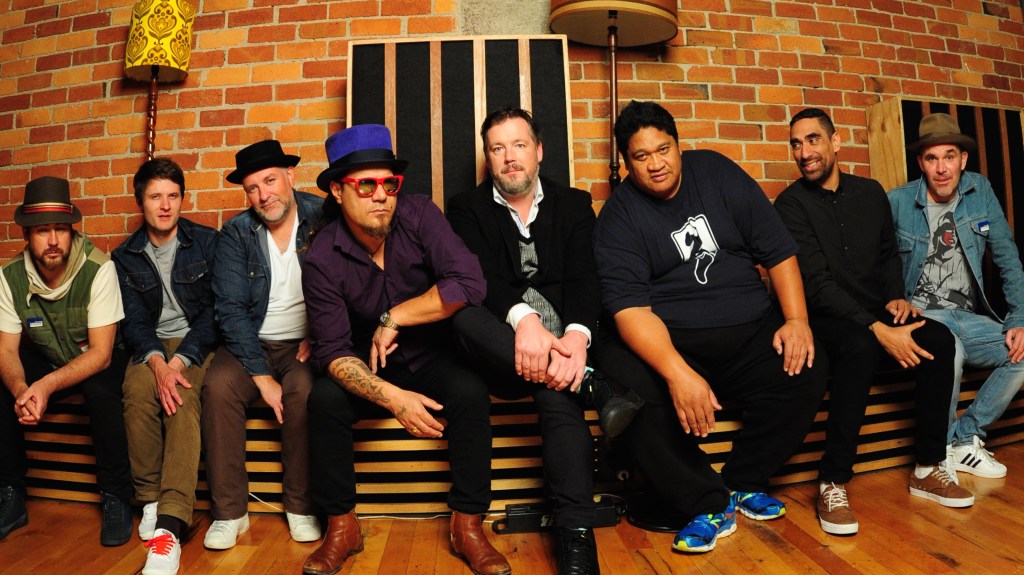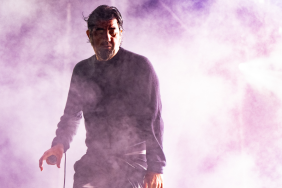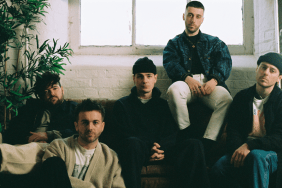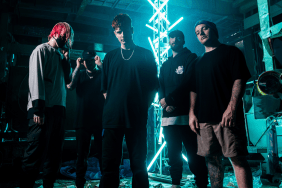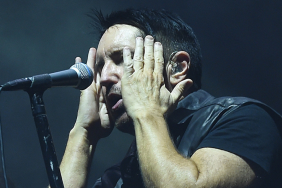It doesn’t feel like the party has ever ended for Fat Freddy’s Drop.
For over a decade now the Kiwi supergroup has been touring the world, including multiple visits to Australian shores, plying their signature hybrid of dub, soul, techno, r’n’b, reggae and whatever else tickles their fancy, for hordes of rapturous fans.
And as other contemporary acts fight to maintain a level of relevance, constantly pushing themselves to evolve and adapt in order to sell records and tickets, Freddy’s naturally progressive approach to music has ensured they’ve never had to struggle to pull a crowd – as proven by the fact that they’re now poised to headline their largest ever tour to Australia off the back of new album, Bays.
Music Feeds spoke with the band’s saxophonist Chopper Reedz about why the spontaneous nature of Fat Freddy’s Drop’s music has ensured enduring and growing success on the live circuit, why the song writing new album Bays is unlike any of their previous records, and why this tour will see the band premiere more new music on stage than they ever have before in their career.
Listen: Fat Freddy’s Drop – Razor
Music Feeds: You’re set to come to Australia for your biggest headline tour to date to celebrate Bays. You’ve been coming to this country for a long time. What do you enjoy about returning to Australia?
Chopper Reedz: Well, one of the things that I really enjoy about the audiences is that there is one and that it seems to be growing! We’ve had, as you say, a long, long history of coming to Australia – first as a support band for Salmonella Dub and working on other bills for other people and then more and more under our own steam.
It just seems that Australia punches above its weight in terms of music and nightlife and the various scenes. I’ve got a lot of friends in the DJ scene over in Melbourne and every week they seem to be posting some amazing international act coming through and I think, “We’re just across here and no-one’s ever coming here.”
New Zealand’s getting a little constricted on the music front, whereas in Australia it just seems to be growing. We love coming across to Australia. It’s got a lot of beautiful venues and up for it audiences, so what’s not to like?
MF: Is the contrast really obvious between those days when you first started coming out and you were supporting artists and playing dodgy or different venues with now, when you’re achieving feats like selling out the Sydney Opera House three times and playing major city tours?
CR: Oh yeah, God yeah. It’s quite funny actually. We played a show up in Brisbane and we walked in and everyone went, “Gosh, this place looks familiar.” And we kind of cast our collective minds back seven or eight years and realised we’d done a double bill with Salmonella Dub up there and had been the opening band on that particular show and the stories started flowing of, “Oh that’s right I blew up my amp on the first song and you had to play the basslines on the keyboard. The trombone player fell asleep half way through the show,” it was just kind of like wat the heck were we doing then? Amateur hour!
But now it’s a completely different thing. Playing those shows at the Opera House over the last three or four years – that’s definitely a bench mark moment and I think probably an interesting one for the audience too. We spoke to one of the programming people from the Opera House after the shows and they said it was one of the most diverse audiences they ever had. It was old school Sydney Opera House fans and young Freddy’s fans and everyone in between.
MF: Selling out shows regularly in Australia is a pretty rare feat for most modern musical acts – especially for one that plays so often. What do you think it is about Fat Freddy’s shows and music that keeps your fans constantly engaged with you and your art?
CR: I think the audience knows that there’s going to be a bit of a ride there at some stage. You’re not going to come to a Freddy’s show and hear the latest record we’ve released played perfectly. I’ve been to lots of “real,” marquee rock band shows and you could be listen to their CD on the biggest PA that you could possibly imagine. With pyrotechnics and 50,000 people, but it’s almost note perfect, you know?
The adrenaline and the excitement is there but perhaps not that sense of unknown, you know? Whereas a Freddy’s show is all about that. The way we write songs, we kind of have a bunch of road markers along the way to make sure that we don’t get completely lost, but getting between one and the next, we’re quite happy to see where the wind blows us on the day.
That’s part of the excitement and where the energy comes from the audience. If they’re really up for that and really behind that, then it’s a really gratifying, energizing two-way street. That’s one of the things we’ve always done that’s become part of the band’s mystique I guess. So I think that’s why are our audiences are growing.
MF: You wrote most of the new record, Bays in studio. How does that work exactly? Do you have ideas in mind or do you just jam and the songs work themselves out?
CR: There were a whole bunch of different ways that some of the songs got put together. One of them was a musical idea and a bassline and a rhythm that has been around for something like eight or nine years and we finally had the time to develop it and see it through. Things like that often take tearing back the layers of an onion a little bit and finding a couple of nasty bits along the way but realising somewhere down the middle there, there’s some goodness.
At the time you just have to be able to concentrate and dedicate the time to it to really get through the troublesome bits and get to the heart of the musical nugget. We stopped working in March after the Sydney Opera House show, so since then all our stuff has been in the studio. We haven’t had any distractions, other than general life, but there’s been no prepping for tours, there’s been no worrying about set lists, there’s been no thinking about travel schedules or anything like that.
It’s just been solely about, “Right, let’s keep working on these musical ideas,” and some of these ideas were like I said, eight or nine years old before they could get fully realised.
Others, we’d buy a record and listen it and go, “Hey that’s a cool little sample. Why don’t we go and have a look at that?” Out of that sample you write a beat and the beat gets reinterpreted and all of a sudden, there it is – the seeds of a new song. So some of them are pretty fresh, the ideas, and some of them have been brewing for a while.
Listen: Fat Freddy’s Drop – Neon
MF: There’s been a distinct rise in the popularity of alternate r’n’b on the charts of late thanks to the likes of Miguel and The Weeknd to name just a couple. There are elements of Bays like 10 Feet Tall and Wheels that I think they would stand really well next to that kind of music. Do you guys feel like you’ve made an album that is pretty perfectly suited to contemporary tastes – and has the modern music climate had much impact on your song writing for this record?
CR: I guess probably the best way to look at that, from my perspective anyway, is our music has always been a real conglomeration of all the things that we find appealing in other music. We’ve always liked techno and house and reggae and dub and soul and all that sort of thing. And we also all listen to commercial radio and the latest releases and whoever it may be. I think everything naturally filters down through our approach of it over time.
And it’s a confidence thing too, probably. There would have been a while where doing a soul tune – we would have loved to have done it because we’re absolute soul fans – but we probably would have pulled just back from the brink a bit and gone, “I don’t know. How can we merge that with this reggae thing?” or whatever. Whereas now we’ll just go, “Nuh, just do a soul tune,” or “We’re just gonna do a reggae thing,” or “actually this is just really a techno jam.
Just do a techno jam. Don’t feel like you need to thread in some other element to make it legit or cover your tracks.” It just feels a little bit more mature and comfortable. We’re pretty comfortable in our own skin now and absolutely we’re happy to wear our influences on our sleeve when it comes to modern music.
The other interesting thing too is that modern music has veered back towards where Freddy’s has always operated. That meshing of dance music and popular music and popular culture is something that Freddy’s has done for a decade. So it’s probably just the gap between more commercially minded music and what we do naturally is a bit slimmer than it once was.
MF: Considering you guys wrote a lot of this material in the studio and you have a reputation for being so formidable live, are you all itching to get out there and perform this new material for crowds for the first time, and not only showcase it but see where it evolves from here on the live stage?
CR: Yeah definitely. It’s an interesting one because normally the recording process can be quite difficult for us because we’re trying to shoe horn things that were established and successful live performances back into a crafted production studio version. Whereas this is the other direction entirely and as a result, you can do quite audacious things in a live performance.
We’re really excited. We were doing some live rehearsal last week and it just felt easy. We were a little bit anxious about how it was going to work live, but we just started playing the tunes and I was like, “Actually this is going to easier than anything we’ve ever done before,” because these songs make so much sense musically, they have just such a strong starting point, we can just go from there and do what we want.
Watch: Fat Freddy’s Drop Behind The Scenes At Bays Studio
MF: Were any of the songs particular standouts when you played them live? Like, “Oh shit, this feels really good.” Or perhaps even better than it sounded on the record?
CR: It’s not so much that they stand out, it’s that we’ve been able to do them justice straight away. I really like 10 Feet Tall. I think that’s a great Freddy’s tune. That and Wheels are textbook Freddy’s tunes.
I love that the arrangement in the studio was so multilayered. We were looking at it going, “Oh my God, how are we going to do this?” But we worked our way through it, picked out the key moments and ideas, pieced it all together, and we were like, “Hey, we can pull this off! We can do this song justice live.”
MF: Well, now you have the enviable task to of picking which songs to perform. How do you guys figure out your set lists these days when you have so much back catalogue to draw from?
CR: To be honest, normally what happens is we rehearse up absolutely everything off the new record and then you kind of realise one or two of these things is a great album track but it’s not really going to work for this live tour.
And it really does come down to the tour sometimes, because you know if you’re lining up to do 20, one-hour festival shows at nine o’clock at night and you’re sandwiched between Disclosure and some hip hop band, you can’t come out there with a beautifully crafted sonic experiment for the first 10 minutes – that’s not going to translate. But if you’re doing headline shows and you’ve got two and a half hours, absolutely! So a lot of it is dictated by the types of shows we’re doing and the environment of those shows.
The good thing about those shows we’re doing in Australia is that they’re our shows, we get to play for a really long time, and by then we would have spent some time playing those songs around Europe and New Zealand and we will know which ones really connect and work in a live environment. And the good thing about it is that I think it will change the catalogue material in our set as well. I think it will push us in some new directions, so that will be fun.
–
Fat Freddy’s Drop have announced an epic Aus tour starting early next year, grab all the deets here.
Watch: Fat Freddy’s Drop – Midnight In Munich
